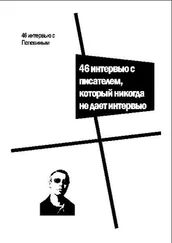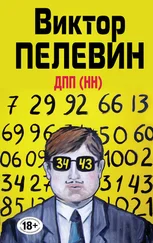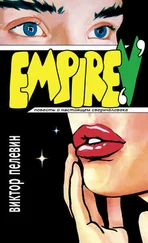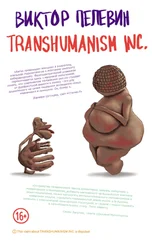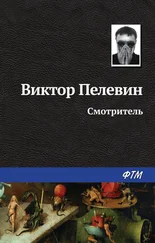Виктор Пелевин - Babylon
Здесь есть возможность читать онлайн «Виктор Пелевин - Babylon» весь текст электронной книги совершенно бесплатно (целиком полную версию без сокращений). В некоторых случаях можно слушать аудио, скачать через торрент в формате fb2 и присутствует краткое содержание. Жанр: Современная проза, на английском языке. Описание произведения, (предисловие) а так же отзывы посетителей доступны на портале библиотеки ЛибКат.
- Название:Babylon
- Автор:
- Жанр:
- Год:неизвестен
- ISBN:нет данных
- Рейтинг книги:5 / 5. Голосов: 1
-
Избранное:Добавить в избранное
- Отзывы:
-
Ваша оценка:
- 100
- 1
- 2
- 3
- 4
- 5
Babylon: краткое содержание, описание и аннотация
Предлагаем к чтению аннотацию, описание, краткое содержание или предисловие (зависит от того, что написал сам автор книги «Babylon»). Если вы не нашли необходимую информацию о книге — напишите в комментариях, мы постараемся отыскать её.
Babylon — читать онлайн бесплатно полную книгу (весь текст) целиком
Ниже представлен текст книги, разбитый по страницам. Система сохранения места последней прочитанной страницы, позволяет с удобством читать онлайн бесплатно книгу «Babylon», без необходимости каждый раз заново искать на чём Вы остановились. Поставьте закладку, и сможете в любой момент перейти на страницу, на которой закончили чтение.
Интервал:
Закладка:
When Tatarsky was out walking one day, he stopped at a shoe shop that was closed for lunch. Swimming about in the summer heat behind the glass wall of the shop window was a fat, pretty salesgirl whom Tatarsky promptly dubbed Maggie, and there in the midst of a chaos of multicoloured Turkish handicrafts stood a pair of unmistakably Soviet-made shoes.
Tatarsky felt a sensation of instantaneous, piercing recognition. The shoes had pointed toes and high heels and were made of good leather. They were a light yellowish-brown, stitched with a light-blue thread and decorated with large gold buckles in the form of harps. It wasn’t that they were simply in bad taste, or vulgar; they were the clear embodiment of what a certain drunken teacher of Soviet literature from the Literary Institute used to call ‘our gestalt’, and the sight was so pitiful, laughable and touching (especially the harp buckles) that tears sprang to Tatarsky’s eyes. The shoes were covered by a thick layer of dust: the new era obviously had no use for them.
Tatarsky knew the new era had no use for him either, but he had managed to accustom himself to the idea and even take a certain bitter-sweet satisfaction in it. The feeling had been decoded for him by the words of Marina Tsvetaeva:
‘Scattered along the dusty shelves of shops (No one has bought them and no one buys!) My poems, like precious wines, will have their day’: if there was something humiliating in this feeling, then it was not he, but the world around him that was humiliated. But in front of that shop window his heart sank in the sudden realisation that the dust settling on him as he stood there beneath the vault of the heavens was not the dust that covered a vessel containing precious wine, but the same dust as covered the shoes with the harp buckles; and he realised something else too: the eternity he used to believe in could only exist on state subsidies, or else - which is just the same thing - as something forbidden by the state. Worse even than that, it could only exist in the form of the semi-conscious reminiscences of some girl called Maggie from the shoe shop. This dubious species of eternity had simply been inserted into her head, as it had into his, in the same packaging as natural history and inorganic chemistry. Eternity was contingent: if, say, Stalin had not killed Trotsky, but the other way round, then it would have been populated by entirely different individuals. But even that was not important, because Tatarsky understood quite clearly that no matter how things panned out, Maggie simply couldn’t care less about eternity, and when she finally and completely stopped believing in it, there wouldn’t be any more eternity, because where could it be then? Or, as he wrote in his notebook when he got home: ‘When the subject of eternity disappears, then all of its objects also disappear, and the only subject of eternity is whoever happens to remember about it occasionally.’
He didn’t write any more poems after that: with the collapse of Soviet power they had simply lost their meaning and value.
CHAPTER 2. Draft Podium
No sooner had eternity disappeared than Tatarsky found himself in the present, and it turned out that he knew absolutely nothing about the world that had sprung up around him during the last few years.
It was a very strange world. Externally it had not changed too much, except perhaps that there were more paupers on the streets, but everything in his surroundings - the houses, the trees, the benches on the streets - had somehow suddenly grown old and decrepit. It wasn’t possible to say that the essential nature of the world had changed, either, because now it no longer had any essential nature. A frighteningly vague uncertainty dominated everything. Despite that, however, the streets were flooded with Mercedes and Toyotas carrying brawny types possessed of absolute confidence in themselves and in what was happening, and there was even, if one could believe the newspapers, some kind of foreign policy.
Meanwhile the television was still showing the same old repulsive physiognomies that had been sickening the viewers for the last twenty years. Now they were saying exactly the same things they used to jail other people for, except that they were far bolder, far more decisive and radical. Tatarsky often found himself imagining Germany in 1946, with Doctor Goebbels shrieking hysterically on the radio about the abyss into which fascism had led the nation, with the former Kommandant of Auschwitz heading the Commission for the Detention of Nazi Criminals, and SS generals explaining in clear and simple words the importance of liberal values, while the whole cabal was led by the newly enlightened Gauleiter of Eastern Prussia. Tatarsky, of course, hated most of the manifestations of Soviet power, but he still couldn’t understand why it was worth exchanging an evil empire for an evil banana republic that imported its bananas from Finland.
But then, Tatarsky had never been a great moral thinker, so he was less concerned with the analysis of events (what was actually going on) than with the problem of surviving them. He had no contacts that could help him, so he dealt with things in the simplest way possible, by taking a job as a sales assistant in a trading kiosk not far from where he lived.
The work was simple enough, but quite hard on the nerves. Inside the kiosk it was half-dark and cool, like inside a tank; Tatarsky was connected with the world by a tiny little window, scarcely large enough to allow him to push a bottle of champagne through it. He was protected against possible unpleasantness by a grille of metal rods crudely welded to the walls. In the evening he handed over the takings to an elderly Chechen who wore a heavy gold ring; sometimes he might even manage to squeeze out a little bit for himself over and above his wages. From time to time novice bandits would come up to the kiosk and demand money for their protection in squeaky, still-breaking voices. Tatarsky wearily directed them to Hussein. Hussein was a short, skinny young guy whose eyes were always oily from the opiates he took; he usually lay on a mattress in a half-empty trailer at the end of the string of kiosks, listening to Sufi music. Apart from the mattress, the trailer contained a table, a safe that held a large amount of money and a complicated version of the Kalashnikov automatic rifle with a grenade-thrower mounted under the barrel.
While he was working in the kiosk (it went on for a little less than a year), Tatarsky acquired two new qualities. The first was a cynicism as boundless as the view from the Ostankino television tower; the second was something quite remarkable and inexplicable. Tatarsky only had to glance at a customer’s hands to know whether he could short-change him and by exactly how much, whether he could be insulting to him, whether there was any likelihood of being passed a false banknote and whether he could pass on a false note himself. There was no definite system involved in all this. Sometimes a fist like a hairy water-melon would appear in the little window, but it was obvious that Tatarsky could quite safely send its owner to hell and beyond. Then sometimes Tatarsky’s heart would skip a beat in fright at the sight of a slim female hand with manicured nails.
One day a customer asked Tatarsky for a pack of Davidoff. The hand that placed the crumpled hundred-thousand-rouble note on the counter was not very interesting. Tatarsky noted the slight, barely visible trembling of the fingers and realised his customer was a stimulant abuser. He could easily be, for instance, some middle-level bandit or businessman, or - as was often the case - something halfway between the two.
‘What kind of Davidoff? Standard or lights?’ Tatarsky asked.
‘Lights,’ the customer replied and leaned down to glance in through the little window.
Читать дальшеИнтервал:
Закладка:
Похожие книги на «Babylon»
Представляем Вашему вниманию похожие книги на «Babylon» списком для выбора. Мы отобрали схожую по названию и смыслу литературу в надежде предоставить читателям больше вариантов отыскать новые, интересные, ещё непрочитанные произведения.
Обсуждение, отзывы о книге «Babylon» и просто собственные мнения читателей. Оставьте ваши комментарии, напишите, что Вы думаете о произведении, его смысле или главных героях. Укажите что конкретно понравилось, а что нет, и почему Вы так считаете.

